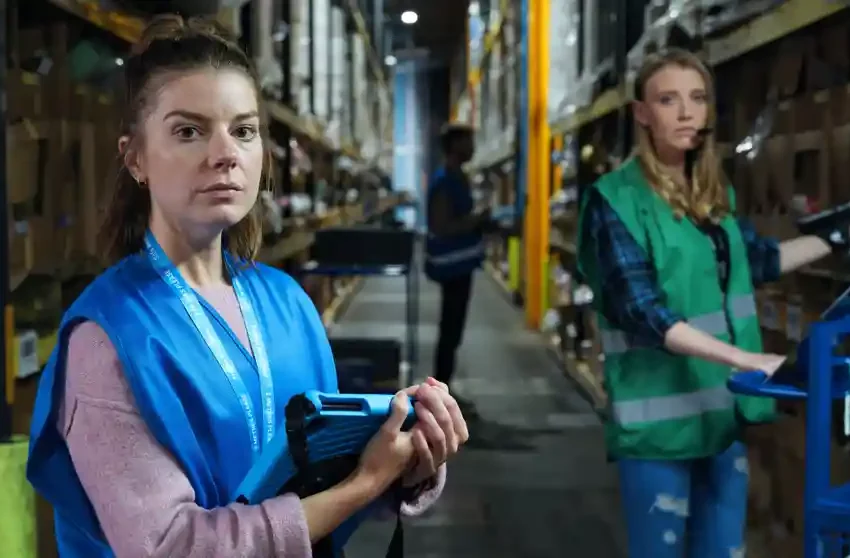
Life and Death in the Warehouse: BBC drama unpacks the anguish behind our next-day deliveries
Everyone shops online. From toothbrushes to shoes to books to cars even, online shopping has infested our lives. The speed, efficiency, and quality of services such as Amazon render the practice totally irresistible and almost addictive.
But what is the sinister reality behind this compulsive habit of ours? New BBC Three drama Life and Death in the Warehouse is here to show us.
The story concerns Megan – played by Aimee-Ffion Edwards (Skins, Luther, Peaky Blinders) – who, through her new job in a warehouse, is to be manager of a large team which includes childhood friend, Alys – played by Poppy Lee Friar (Ackley Bridge).
Until now, Alys has been a valued picker for a year; her job is to pick items and load them on a cart, ready for shipment, with each move dictated by announcements made by an eerily robotic voice. She wears the esteemed green vest which signifies permanent employment, and which some of her colleagues seem to desperately seek. She is bubbly, popular and pleased to see Megan, despite the latter’s manager status.
Alys has a secret however: she is pregnant and as a result, her work rate – the number of items she picks per hour – steadily declines, as one would expect. Megan attempts to get her reassigned to a packing job, expecting this simple request to be granted by her superiors, played by Craig Parkinson (Line of Duty) and Kimberley Nixon (Fresh Meat).
Instead, they cunningly manipulate Megan – who has financial issues at home and thus cannot afford to lose her job – into forcing Alys to work harder and increase her pick rate to the expected 120/hour. They do this through a robotic delivery of slogans, emphasising the need for ‘customer satisfaction,’ ‘doing what is better for the team, not the individual,’ and ‘picking the harder route, not the easy route.’
The big brother like management also enforce policies against unionisation, medical help and legally required breaks through carefully directed surveillance of packages picked, time spent chatting, and even toilet breaks. You can’t help wondering: is this stuff even legal?
All these actions have disastrous and heart-breaking consequences, which is interspersed with warming scenes of friendship and romance, making it all the more painful to watch. Yet, in the end, the vast Orwellian power of the company reigns supreme.
Life and Death in the Warehouse is a damning indictment of Jeff Bezos’ Amazon and similar companies who sit at the top of this pyramidal structure. They engender the complete dehumanisation of the worker, who has far more to their identity than just ‘the worker’ alone. The refusal to recognise this is the key flaw of the management, whose relentless and ruthless pursuit for efficiency creates a force so destructive that, at the show’s pinnacle, Megan feels unable to call an ambulance for childhood friend Alys, who is miscarrying, crying and covered in blood.
Written by Helen Black, in her first attempt at TV movie writing, and directed by BAFTA-winning director Joseph Bullman (Killed by My Debt), the editing captures the frenzy of the workplace, and the fast-paced writing and use of jarring close ups makes you feel as broken and despaired as the workers you watch on screen.
Black and Bullman deserve high praise. Life and Death may appear to exaggerate what actually occurs in workplaces like these, but it is based on true stories collected over the years. Their work demonstrates meticulous research and a sincere attempt to understand the lives portrayed.
Perhaps they even want to suggest a solution, but its didactic approach should not be overstated. Their achievement is lies in how they have brought attention to this important issue. Ultimately, Life and Death is intended as a valuable and eye-opening insight into the plight of workers in the internet age.
Life and Death in the Warehouse is a must watch for everyone: if this doesn’t make you start giving thought to what actually goes into those Amazon packages, then I don’t know what else will.

